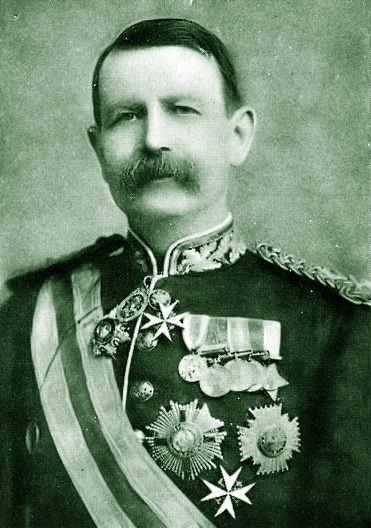
General Sir Charles Warren , a Royal Engineer officer, had a varied military career, most noteworthy for his archeological achievements and his command of British troops at the disastrous Battle of Spion Kop (23–24 January 1900) du ring the Second Boer War.
Warren was born in North Wales in 1840. His father was an Indi an Army officer who later became a general, and the younger Warren was seemingly destined for a military career. Warren was educated at Cheltenham and commissioned into the Royal Engineers in 1857.He conducted surveys of Gibraltar from 1858 to 1865, when he became an instructor at the School of Military Engineering at Chatham. Between 1867 and 1870 he carried out explorations in Palestine of the topography of ancient Jerusalem and the archaeology of the Temple Mount/Har am al – Sherif area.
In 1876, Warren surveyed the border between the Orange Free State and Griqualand West, and was in South Africa when the Ninth Cape Frontier War broke out in 1877, in which he commanded the Diamond Field Horse. He returned to engineer instructor duty in England in 1878 but was selected for a special mission in 1882. His task was to find a Professor Palmer and his party who had disappeared while trying to rally the support of Sinai Bedouins in the British war against Egypt. Warren was able to ascertain that Palmer had been killed and brought the culprits to justice, receiving a knighthood for his performance.
Warren returned to Chatham in 1882 and in 1884 commanded the British expedition in Bechuanaland, which was established as a Crown Colony. He commanded the British garrison at Suakin, on the Red Sea, for a short time before becoming commissioner of the Metropolitan Police in London. His tenure was controversial, including the use of heavy- handed measures to suppress socialist meetings. The failure of the police to solve the Jack the Ripper murders in 1888 forced both the home secretary and Warren to resign their positions.
In 1889, Warren became commander of troops at Singapore, was promoted to major general in 1893, and returned to England in 1895 to become general officer commanding Thames and Medway District. He was promoted to lieutenant general in 1897. After the outbreak of the Second Boer War in October 1899, Warren was appointed to command the 5th Division in South Africa, under General Sir Redvers H. Buller, V. C., who was attempting to relieve Ladysmith.
Warren’s selection was somewhat surprising, because of his age (fifty-nine), tactlessness, disagreeable temper, lack of recent troop experience, and previous disagreements with Buller. The relationship was made worse when Buller was informed that Warren held the “dormant commission,” instructions to succeed Buller if he was killed or incapacitated.
Warren was put in charge of the January 1900 operation to relieve Ladysmith by outflanking the Boers to the west of Spion Kop. The ponderous advance began on 16 January, and initial efforts to seize Spion Kop were ineffectual. A night assault, 23–24 January, was successful, and by dawn on 24 January the British had taken the hill — and then realized their defensive trench was in the center of a large plateau sloping toward the enemy in the north. Boer artillery, virtually unopposed, pounded the British infantry, and Boer marksmen enfiladed the British trench. Command and control was a problem, both on Spion Kop and between British forces there and Warren, who had to rely on messengers. When Warren became aware of the critical nature of the battle, he failed to order a diversionary attack. Despite British reinforcements straggling in, the ebb and flow of battle and fierce hand – to – hand fighting continued for much of the day. When night fell, the British thought they were in an untenable position and withdrew from Spion Kop; the Boers, discouraged by their apparent failure to dislodge the British, were about to give up but reoccupied the summit and claimed victory. The British claimed their losses as 322 killed, 583 wounded, and 300 prisoners of war, but this may have been an underestimate. Buller placed the blame for the debacle on Warren, who was reassigned to Griqualand West and returned to England in August 1900.
Warren was promoted to general in 1904, retired the same year, and died in 1927.
References: Pakenham (1979); Ransford (1969); Spiers (1992); Symons (1963)